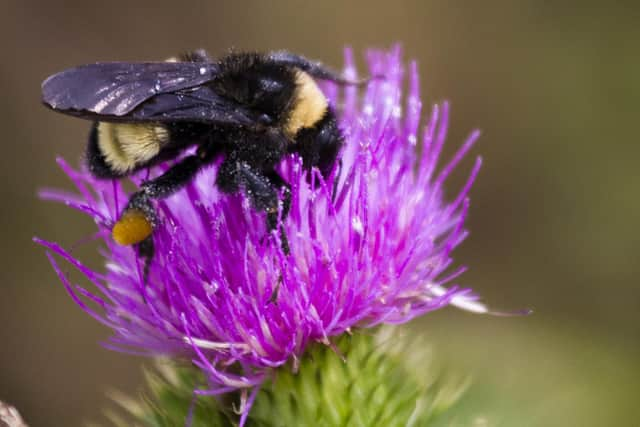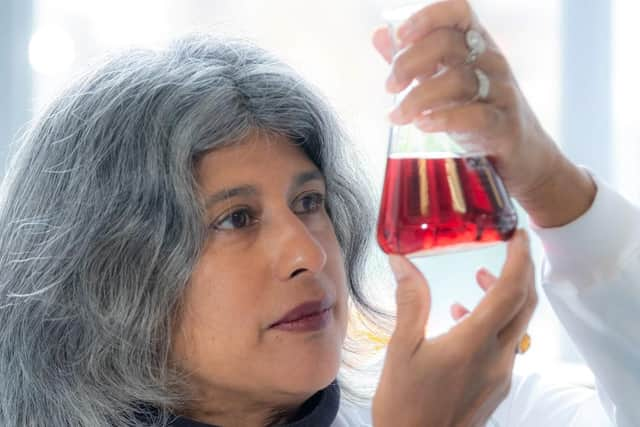Scottish firm to lead field in green pesticides after £1.3m funding boost
SOLASTA Bio, a spinout company of the University of Glasgow, specialises in creating next-generation green insecticides – the first of their kind globally.
The firm has secured seed funding to support ongoing development of the unique eco-friendly pest control products.
Advertisement
Hide AdAdvertisement
Hide AdThe company has developed the world's first technology platform for creating neuropeptide-based insect control products that are nature-based rather than selected from a synthetic chemistry library.


SOLASTA Bio was set up in May 2020 after four years of research funded by UK Research and Innovation’s Biotechnology and Biological Research Council and the European Commission, plus commercialisation support from Scottish Enterprise’s High Growth Spinout Programme.
Its products aim to meet a global need for new and effective crop protection that minimises damage to the environment.
The method involves using neuropeptide-based bio-insecticides to target physiological processes and can be adapted to target any pest species.


The biopesticides are also designed to preserve the ecosystem by protecting beneficial pollinators in an environmentally friendly and sustainable manner.
Professor Shireen Davies, chief executive of SOLASTA Bio, said: “The global market for insecticides has been under intense scrutiny for many years now, with growing demands on food production requiring greater levels of crop protection, counterbalanced by heightened concerns for the environment.
“Through our proprietary technology platform we have developed a world-leading solution which represents a profound change for how insect control agents are discovered, and a step change in how we not only protect our crops worldwide, but also our ecosystem.”
SOLASTA Bio is now aiming to take trials of its products out of the laboratory and into real-world settings, with hopes the first biopesticides will be brought to market in 2027.
Advertisement
Hide AdAdvertisement
Hide AdInvestors in this seed funding round include Yield Lab Europe, SIS (Social Investment Scotland) Ventures, members of Cambridge Agritech and UKI2S.
Founding investors UKI2S and Scottish Enterprise provided earlier support.
Rob Halliday, senior investment manager at SIS Ventures, said: “To deal with the unique challenges of today, the global agribusiness industry is crying out for environmentally friendly innovative new approaches to effective pest-control.
“We believe SOLASTA Bio’s technology is a game-changer in this regard.
“By delivering the next generation of nature-inspired green insecticides, SOLASTA Bio will create profound environmental and societal impact.”
The global insecticides market is dominated by synthetic chemicals, which account for 94 per cent of insect control solutions.
Three quarters of all food crops are dependent on pollinator insects such as bees, flies, wasps, beetles and butterflies – in the UK alone supplying crucial services each year for crops worth £690 million.
But other insects cause significant social, health and economic damage.
Advertisement
Hide AdAdvertisement
Hide AdThe insecticides market is under increasing pressure to find new control methods due to widespread insect resistance, lack of species specificity, harm to important pollinators caused by some chemicals, increasing regulatory controls and consumer preferences for non-chemical residues.
Victoria Carmichael, director of strategic investments at Scottish Enterprise, said: “The rate at which Scotland’s academic institutions continue to produce game-changing spinouts is staggering, with SOLASTA being another great example of an entrepreneurial culture that transforms world-leading research into real-world applications.
“SOLASTA is developing products with global appeal that will benefit the environment, conserve natural resources, and preserve biodiversity.”
Oliver Sexton, investment director at UKI2S, added: “SOLASTA’s platform of highly selective biopesticides will provide an alternative to environmentally damaging crop protection agents.
“UKI2S is excited by the team’s technology, which has global potential and is addressing large agritech markets.”
A message from the Editor:
Thank you for reading this article. We’re more reliant on your support than ever as the shift in consumer habits brought about by coronavirus impacts our advertisers.
If you haven’t already, please consider supporting our trusted, fact-checked journalism by taking out a digital subscription.
Comments
Want to join the conversation? Please or to comment on this article.
